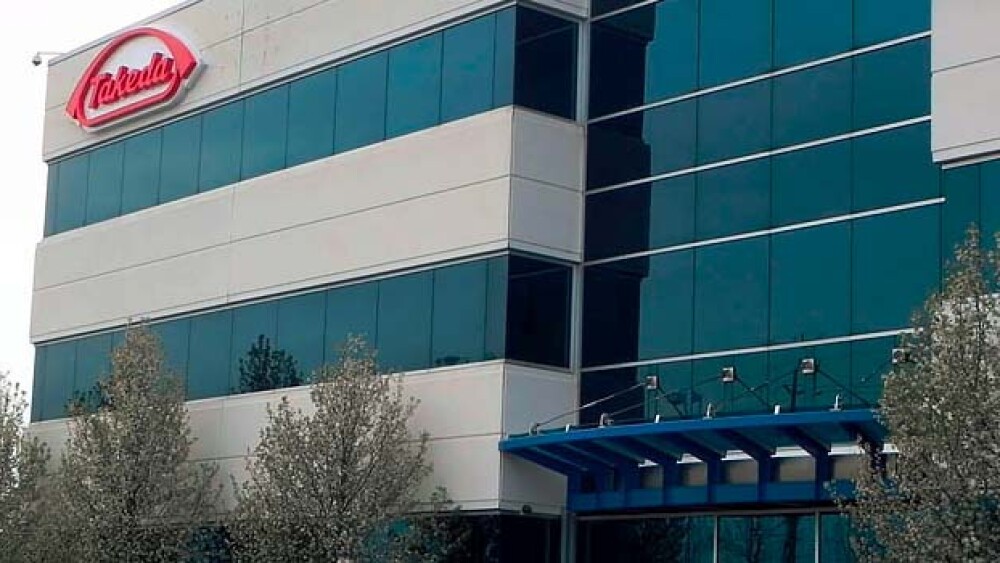Takeda Pharmaceutical released data from its Phase IIIb/IV clinical trial for Adynovate. On the same day, jurors in a Delaware federal court ordered Takeda’s Baxalta unit to pay $155.19 million to Bayer AG for infringing a patent for Adynovate.
Takeda Pharmaceutical released data from its Phase IIIb/IV clinical trial for Adynovate at the 12th Annual Congress of the European Association of Haemophilia and Allied Disorders (EAHAD). On the same day, jurors in a Delaware federal court ordered Takeda’s Baxalta unit to pay $155.19 million to Bayer for infringing a patent for Adynovate.
Adynovate [Antihemophilic Factor (Recombinant), PEGylated)] was first approved by the U.S. Food and Drug Administration (FDA), then approved in Japan, Canada, and Colombia, and then, as Adynovi in the European Union as well as Iceland, Liechtenstein, Norway and Switzerland. The drug is approved for the treatment and prophylaxis of bleeding associated with hemophilia A in patients 12 years and older.
Hemophilia A is an X-linked, recessive disease caused by a deficiency of functional plasma clotting factor VIII (FVIII). It can be inherited or be caused by a spontaneous mutation. Depending on the FVIII activity levels, patients may bruise easily, have inadequate clotting from mild to traumatic injuries, and in the case of severe hemophilia, spontaneous hemorrhage.
The data released from the PROPEL study compared the safety and efficacy of Adynovate after PK-guided prophylaxis targeting two different FVIII trough levels in patients with severe hemophilia A. The bottom line was the data suggested that optimizing FVIII profiles via PK-driven dosing that targets trough levels 8 to 12 percent was consistently achievable and that a personalized medicine approach for treating hemophilia A should be considered.
“The study reiterates the importance of personalized prophylaxis for those living with hemophilia,” stated Robert Klamroth, Head of the Department of Internal Medicine Angiology and Coagulation Disorders and Director of the Comprehensive Care Haemophilia Treatment Center and the Haemostasis and Thrombosis Unit at the Vivantes Klinikum in Berlin, Germany.
Kamroth added, “The findings suggest the need to measure actual FVIII levels and show a clear trend that if we’re able to keep FVIII levels in a higher range, there may be better patient outcomes, including enhanced bleed protection that could help more patients reach zero bleeds.”
Meanwhile, the Delaware jurors rejected Takeda/Baxalta’s argument that a June 2016 patent held by Bayer for Adynovate was invalid. Bayer’s attorneys, Sidley Austin LLP, argued that the infringement came out of Baxalta’s license deal with Nektar Therapeutics. Nektar, based in San Francisco, had conducted research with Bayer and was aware of the patent.
Bayer claimed it had been researching and developing the role of Factor VIII for hemophilia A in 2003 and signed a confidential disclosure agreement with Nektar. This disclosure allowed Bayer to share information regarding its research with Nektar. But after the disclosure, Nektar “secretly” filed a provisional patent application. Bayer’s own research led to the development of BAY 94, a pegylated recombinant human Factor VIII. In the original claim, Bayer alleged that “Nektar secretly sought out a partnership with Baxter, Baxalta Inc’s corporate predecessor, to develop its own pegylated Factor VIII replacement therapy.”
The jurors awarded Bayer $155.19 million, which covered royalties from June 14, 2016 to Nov. 30, 2018. It was based on a royalty rate of 17.78 percent to a royalty base of $872.84 million.
Baxalta was based in Illinois prior to being acquired by Shire in 2016. In January 2019, Takeda completed its acquisition of Shire for about $59 billion.
In a statement, Takeda indicated it was disappointed with the verdict. “As a company, we are committed to developing and commercializing products with the best interest of patients in mind, and without violating the intellectual property rights of third parties.”
Adynovate and other hemophilia treatments brought in $2.23 billion for Shire in the nine months ending Sept. 30, 2018, including $1.15 billion in the U.S.





